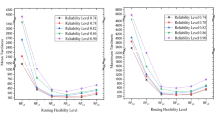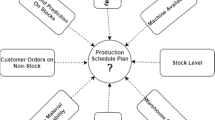Abstract
In China, delivery delays due to a high probability of operational unit failure often occur in perishable manufacturing systems. This paper proposes a rescheduling algorithm known as complete rerouting (CR) for perishable manufacturing systems. The perishable characteristics of agri-products and the stochastic invalidity of operational units are researched. Products and operational units of the system are simulated by agents. In the developed virtual perishable manufacturing system, multiple product agents with different deadlines, values, and due dates search for the best processing route according to scheduling principles. When an operational unit fails stochastically, agents update their status and reroute their path using the rescheduling algorithm. The transition of agents can be described by the Petri net model proposed in this paper. Three basic experiments are investigated, validating the rescheduling algorithm proposed. This study demonstrates that the CR policy causes product agents to search for the best rerouting path compared to other rescheduling policies (i.e., right-shift scheduling and new-job rerouting). The optimal delivery times of products are determined based on penalty cost. Furthermore, this study analyzes the sensitivity of scheduling performance due to different product batches with two failed operational unit statuses (i.e., high frequency, short maintenance, and low frequency, long maintenance).
Similar content being viewed by others
References
Chen ZS (2012) The processing warehouse design for agricultural supply chain. Logist Technol 18:64–67
Shirvani N, Ruiz RB, Shadrokh S (2014) Cyclic scheduling of perishable products in parallel machine with release dates, due dates and deadlines. Int J Prod Econ 156:1–12
Palombarini J, Martinez E (2012) SmartGantt—an intelligent system for real time rescheduling based on relational reinforcement learning. Expert Syst Appl 39:10251–10268
De Raedt L (2008) Logical and relational learning. Springer, Berlin
Driessens K, Ramon J, Blockeel H (2001) Speeding up relational reinforcement learning through the use of an incremental first order decision tree learner. In: De Raedt L, Flach P (eds) Twelfth European conference on machine learning ECML, vol 2167. LNCS Springer, Freiburg, pp 97–108
Rao AS, Georgeff MP (1995) BDI agents: from theory to practice. In: Process of the 1st International Conference on Multi-agent Systems. AAAI Press, San Francisco
Husan SMK, Sarker R, Essam D (2011) Genetic algorithm for job-shop scheduling with machine unavailability and breakdown. Int J Prod Res 49(16):4999–5015
Nasr A-H, EIMekkawy TY (2011) Robust and stable flexible job shop scheduling with random machine breakdowns using a hybrid genetic algorithm. Int J Prod Econ 132(2):279–291
Tripathy B, Dash S, Kumari PS (2015) Dynamic task scheduling using a directed neural network. J Parallel Distrib Comput 75:101–106
Fahmy SA, Balakrishman S, EIMekkawy TY (2008) A generic deadlock-free reactive scheduling approach. Int J Prod Res 46(1):1–20
Subramaniam V, Raheja AS, Reddy KRB (2005) Reactive repair tool for job shop schedules. Int J Prod Res 43:1–23
Sarker R, Omar M, Hasan KSM, Essan D (2013) Hybrid evolutionary algorithm for job scheduling under machine maintenance. Appl Soft Comput 13:1440–1447
Marichelvam MK, Prabaharan T, Yang XS (2014) Improved cuckoo search algorithm for hybrid flow shop scheduling problems to minimize makespan. Appl Comput 19:93–101
Albers S, Schmdt G (2001) Scheduling with unexpected machine breakdown. Discret Appl Math 110:85–99
Jia CF (2004) On minimizing completion time variance on a single machine subject to stochastic breakdown. Oper Res Trans 2:1–8
Lu CC, Ying KC, Lin SW (2014) Robust single machine scheduling for minimizing total flow time in the presence of uncertain processing times. Comput Ind Eng 74:102–110
Ye Y, Li J, Li ZK, Tang QH (2014) Robust optimization and stochastic programming approaches for medium-term production scheduling of a large-scale steelmaking continuous casting process under demand uncertainty. Comput Chem Eng 66:165–185
Amorim P, Belo-Filho MAF, Toledo FMB, Almeder C, Almada-Lobo B (2013) Lot sizing versus batches in the production and distribution planning of perishable goods. Int J Prod Econ 146:208–218
Cai XO, Chen J, Xiao YB, Xu XL (2008) Product selection, machine time allocation, and scheduling decisions for manufacturing perishable products subject to a deadline. Comput Oper Res 35:1671–1681
Li J, Rodriguez D, Zhang D, Ma K (2015) Crop rotation model for contract farming with constraints on similar profits. Comput Electron Agric 119:12–18
Viergutz C, Knust S (2014) Integrated production and distribution scheduling with lifespan constraints. Ann Oper Res 213:293–318
Akturk MS, Gorgulu E (1999) Match-up scheduling under a machine breakdown. Eur J Oper Res 112:81–97
Suwa H, Sandoh H (2007) Capability of cumulative delay based reactive scheduling for job shops with machine breakdowns. Comput Ind Eng 53:63–78
Zakaria Z, Petrovic S (2012) Genetic algorithm for match-up rescheduling of the flexible manufacturing system. Comput Ind Eng 62:670–686
Choi H, Kim JS, Lee DH (2013) Real-time scheduling for reentrant hybrid flow shops: a decision tree based mechanism and its application to a TFT-LCD line. Expert Syst Appl 38:3514–3521
Abumaizar RJ, Svestka JA (1997) Rescheduling job shops under random disruptions. Int J Prod Res 35:2065–2082
Merdan M, Moser T, Vrba P, Biffl S (2011) Investigating the robustness of re-scheduling policies with multi-agent system simulation. Int J Adv Manuf Technol 55:355–367
Gupta AK, Sivakumar AI (2005) Conjunctive simulated scheduling. Int J Adv Manuf Technol 26:1409–1413
Baykasoglu A, Gocken M, Unutmaz ZD (2008) New approaches to due date assignment in the job shops. Eur J Oper Res 187(1):31–45
Threr M, Huang G, Stevenson M, Silva C, Filho MG (2012) The performance of due date setting rules in assembly and multi-stage job shops: an assessment by simulation. Int J Prod Res 50:5949–5965
Li J, Ding C, Liu W (2014) Adaptive learning algorithm of self-organizing teams. Expert Syst Appl 41(6):2630–2637
Renna P (2012) Influence of maintenance policies on multi-stage manufacturing systems in dynamic conditions. Int J Prod Res 50:345–357
Yang Z, Chang Q, Djurdjanovic D, Ni J, Lee J (2007) Maintenance priority assignment utilizing on-line production information. J Manuf Sci Eng 129:435–446
Roux O, Duviver D, Quesnel G, Ramat E (2013) Optimization of preventive maintenance through a combined maintenance-production simulation model. Int J Prod Econ 143:3–12
Boccalatte A, Grosso A, Paolucci M, Tamoglia M (2004) A multi-agent system for dynamic just-in-time manufacturing production scheduling. In: 2004 I.E. International Conference on Systems, Man and Cybernetics, vol. 6, pp 5548–5553
Merdan M, Moser T, Sunindyo W, Biffl S, Vrba P (2013) Workflow scheduling using multi-agent systems in a dynamically changing environment. J Simul 7:144–158
Yin YQ, Wang Y, Cheng TCE, Wang DJ (2016) Two-agent single-machine scheduling to minimize the batch delivery cost. Comput Ind Eng 92:16–30
Arthaniari TS, Ramamurthy KG (1971) An extension of two machines sequencing problem. Oper Res 8:10–22
Xiong J, Xing LN, Chen YW (2013) Robust scheduling for multi-objective flexible job-shop problems with random machine breakdowns. Int J Prod Econ 141:112–126
Li SF, Zhu YL, Yin CW (2005) Flow shop scheduling with stochastic processing times and machine breakdowns. Comput Integr Manuf Syst 11:1425–1429
Kutanoglu E, Sabuncuoglu I (2001) Routing-based reactive scheduling policies for machine failures in job shops. Int J Prod Res 39:3141–3158
Leon VJ, Wu SD, Storer RH (1994) Robustness measures and robust scheduling for job shops. IIE Trans 26(5):32–43
Author information
Authors and Affiliations
Corresponding author
Rights and permissions
About this article
Cite this article
Chen, W., Li, J. & Ma, W. Hybrid flow shop rescheduling algorithm for perishable products subject to a due date with random invalidity to the operational unit. Int J Adv Manuf Technol 93, 225–239 (2017). https://doi.org/10.1007/s00170-016-8859-y
Received:
Accepted:
Published:
Issue Date:
DOI: https://doi.org/10.1007/s00170-016-8859-y




